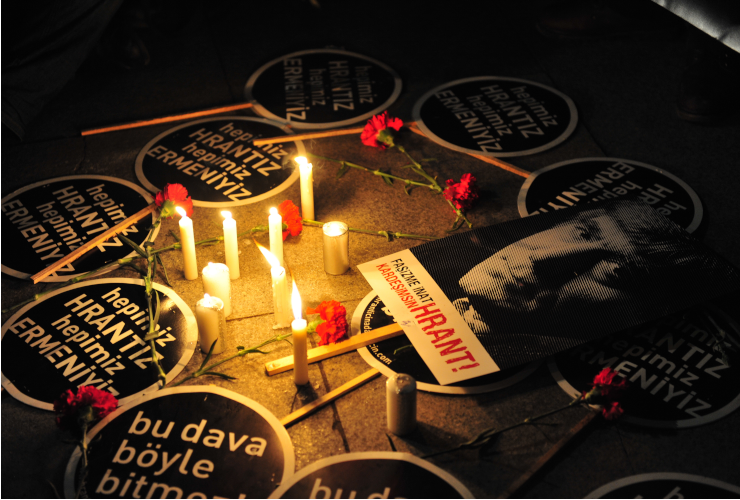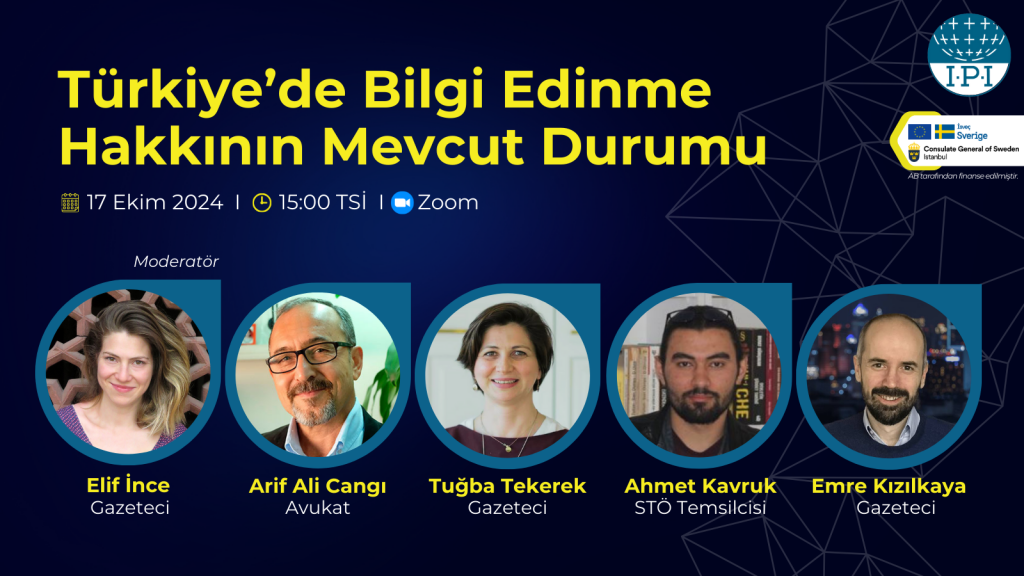International Press Institute (IPI), today called for a court ruling in the murder case of Turkish-Armenian journalist without further delay. The ruling in the case, where several public officials are being prosecuted for involvement with the killing, must serve to help end impunity and send the right message for combatting violence against journalists. Therefore, IPI expresses once again its concerns regarding the length of the trial and lack of accountability for Dink’s murder.
On March 5, 2021, the first instance court was expected to render a verdict in a case on the responsibility of certain public officials concerning Dink’s murder after more than 14 years. However, the court, yet again, adjourned the trial, this time until March 26, 2021, due to the sick leave of one of the judges in the court panel.
“We expect a ruling that serves justice without further delay. Unfortunately, the entire process since 2007 has been highly problematic due to various hindrances stretching from the police investigation to the court process. This case must be given the highest degree of priority to help break the cycle of impunity”, IPI Deputy Director Scott Griffen said.
On January 19, 2007, Dink was shot in broad daylight outside the Istanbul office of Agos, the Armenian-language newspaper he founded. The murder of Dink sparked outrage both domestically and internationally.
Legal quagmire
Achieving justice for Dink has been a problematic and arduous process. Various investigations carried out after the murder were insufficient and did not reveal all those who took part in the murder, including the masterminds, or how the murder was carried out. The revelation of the authorities’ complacency and alleged active involvement in the murder also hampered the entire process, leading to a failure to investigate certain individuals or matters.
Following Dink’s murder, police arrested Ogün Samast, a then 17-year-old ultranationalist suspected of carrying out the killing. Later, a series of photos were revealed showing two police officers posing for the camera with Samast while carrying a Turkish flag at the police station, causing outrage and raising questions about possible state involvement in the murder.
Later, a juvenile court – as Samast was under 18 at the time of Dink’s murder – sentenced Samast to 22 years and 10 months in prison for premeditated murder and carrying an unlicensed gun. The verdict became final on March 21, 2012 after the Court of Cassation upheld the ruling. However, under the legal framework for the execution of sentences, he was to serve only 15 years of the total sentencing. Consequently, Samast was supposed to be released in August 2020, however, his confinement was reportedly extended due to his involvement in a fight with prison guards.
Apart from Samast, several other civilians were also tried for the murder of Dink. As it would be revealed later, the murder was the consequence of a wider conspiracy and planning as there were other individuals who instigated and aided Samast in Dink’s killing. Initially, only three of them were convicted and the rest were acquitted. Later, however, the Court of Cassation overturned some of the judgments and sent the files back to the first instance court for re-examination.
Dink’s family also applied to the European Court of Human Rights (ECtHR) concerning the violation of Dink’s right to life and several shortcomings in the authorities’ approach to the murder investigation. In 2010, the ECtHR found that there had been violations of Dink’s right to life and freedom of expression and that Turkey had failed to comply with its obligations stemming from the European Convention on Human Rights.
Meanwhile, for many years no lawsuits were filed nor were thorough investigations carried out regarding the possible involvement of state officials. Finally, in 2017, ten years after the murder, the prosecutor’s office in Istanbul finally indicted a number of public officials, including individuals from the police intelligence unit of the General Directorate of Security, various police departments and provincial gendarmerie commands, some for their failure to address and prevent the threats against Dink sufficiently and some for their alleged collaborations with the perpetrators.
The case files of the accused officials and civilians whose verdicts were overturned by the Court of Cassation were merged with this case by the court. As a result, there were more than 80 defendants in the case file. Later, however, the civilians’ cases were separated as the time limit (statute of limitation) of prosecution for the civilian defendants was approaching.
In the public officials’ case, the prosecutor finally presented its final opinion on the case on December 15, 2020, requesting most of the defendants to be convicted, while some to be acquitted. Yet the court granted only two days to the lawyers of Dink’s family to present a statement on the prosecutor’s final opinion, raising allegations that the court wanted to conclude the trial before 2021 and prompting lawyers to protest. During the hearings in December and January, the court heard the final statements of the defendants in order to reach a conclusion.
On March 5, 2021, the court was expected to give its final ruling after more 14 years of the murder, yet the hearing was postponed once again due to one judge’s being on sick leave. Now the final hearing is scheduled to take place on March 26, with many awaiting justice to be served. However, even if the court sentences the defendants for their involvement with the murder or failure to protect Dink’s right to life and security, the process is not over yet. It is highly likely that the parties, whether the convicted parties, the prosecutor or the Dink family, may appeal the decision, which again might take years.
In overall, the entire process has proved to be arduous. It remains unclear who is the ultimate mastermind. Throughout the years the blame has shifted from one group to another. Also, not only has it taken over a decade to hold responsible officials accountable, but authorities were also reluctant to investigate the murder from the beginning – probably fearing that such investigation would implicate more and those in high places. The Dink family and numerous observers continue to suggest that not everyone that is responsible for the murder will be held accountable and that aspects of the case have been hushed up. For instance, investigations against members of the Turkey’s National Intelligence Organization (MIT) for Dink’s murder, were either ignored or subjected to time limitations due to the negligence of authorities. Recently, the Dink family applied to the ECtHR for a second time for the alleged ineffectiveness of criminal proceedings regarding MIT member’s involvement.
All these developments cause observers to question the quality and adequateness of the justice ahead of the ruling on March 26. Dink family and stakeholders from domestic and international community have sought justice for this heinous murder. The well-known legal maxim goes as “justice delayed is justice denied.” In addition to this remark, all those who have sought justice for Dink ask: “Is delayed and incomplete justice still justice?”
Hrant Dink as a journalist
Dink was a prominent editor and columnist, known for his reporting on minority rights in Turkey and for advocating Turkish-Armenian reconciliation. He always supported peace, regardless of how hostile the environment was.
He was subjected to numerous lawsuits and other forms of harassments for his articles about history of Armenians in Turkey and received the ire of Turkish nationalists. He had faced multiple allegations of “insulting Turkishness”, which was a crime until amended in 2008 under the infamous Article 301 of the Turkish Criminal Code. Although the aforementioned article was amended as a result of Turkey’s EU accession talks, the amended version still criminalizes insulting the Turkish nation.
In line with Dink’s commitment and contribution to freedom of press, IPI named Hrant Dink one of IPI’s World Press Freedom Heroes in 2007. IPI commemorates Hrant Dink once again as an extraordinary individual, dedicated journalist and unwavering supporter of peace.




